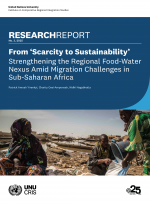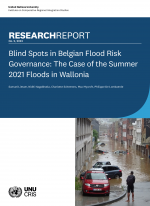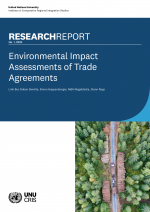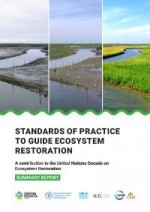Polycrisis in the MENA Region: Spotlight on the Water-Energy-Food Nexus
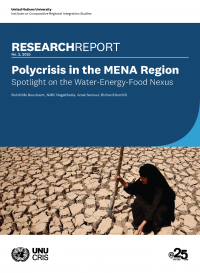
The Water-Energy-Food (WEF) Nexus in the Middle East and North Africa (MENA) Region provides strategic insights for the region that faces complex interconnected challenges in the water, energy, and food security domain. We call for an integrated approach while explaining how current strategies reveal both limitations and promising opportunities for addressing these critical interdependencies. Governments in the MENA region are gradually recognizing the importance of the WEF nexus approach, but implementation remains limited. Key challenges include: weak coordination across water, agricultural, and energy policy sectors; fragmented policy frameworks; limited understanding of cross-sectoral interactions and climate change policies treated as peripheral rather than core development challenges.
In this context, we aim to 1) answer to what extent the governments in the MENA region consider the WEF nexus in their strategies and 2) evaluate the potential of integrated approaches to address the polycrisis. We did this by focusing on two case studies, starting from the solution offered to one node of the nexus, but strongly related to the others. We try to find out how far there is a focus on the other nodes of the nexus, and if integrated approaches could be a solution. We reflect on opportunities and challenges for both countries, with conclusions and the way forward. The first case study is on desalination in Jordan to solve its water scarcity. Jordan has one of the world’s highest energy dependencies, and is dependent for 98% of its consumable items on imports.
The second case study is on green hydrogen in Algeria. This is a solution for the peak fossil fuel demand expected to be reached before 2030 (International Energy Agency, 2024). This would cause a diminishment of fossil fuel rents on which Algeria depends. Algeria suffers from water and homegrown food scarcity, as does Jordan. We conclude by focusing on the nexus approach to effectively address the polycrisis. The MENA region could focus on: a) knowledge integration that bridges data and information gaps in WEF nexus understanding; b) assessment and/or quantify inter-linkages between water, energy, and food sectors towards developing integrated policy approaches; c) in terms of governance and institutional frameworks establish science-based evidence that connects science and policy and creates forums for best practices in nexus governance; d) implement collaborative capacity-building programs.
Regarding case studies, the first case study addresses water scarcity through energy-intensive desalination, highlighting the interdependence of water and energy sectors. The point in the second case study is to diversify economic strategies, as the region will also have to deal with potential reductions in fossil fuel revenues. We anticipate that an integrated WEF nexus approach offers significant advantages to exploring sector-specific trade-offs, enhancing resource efficiency, and supporting sustainable development goals. The region must transition from siloed sector management to an integrated, holistic approach by recognizing the complex interactions between water, energy, and food systems, and the region can develop more resilient and sustainable strategies for addressing WEF-related challenges.

